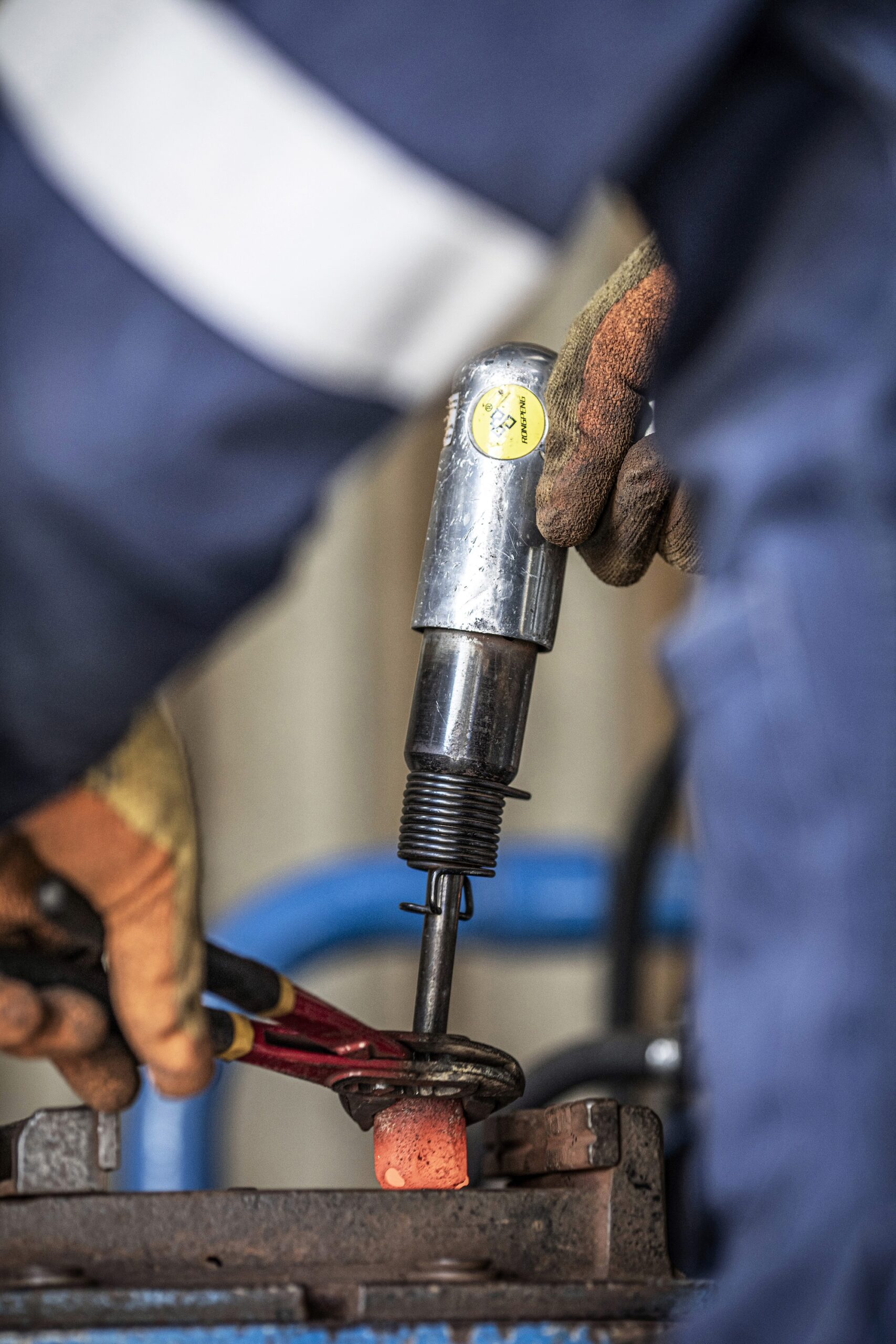Reuse – it’s the way forward
By creating business opportunities for local entrepreneurs, the Sandvik Mining and Rock Solutions carbide recycling program is enabling a better future for mining communities in South Africa. It is also showing a way forward to a sustainable future for the industry.
Sandvik Mining and Rock Solutions has been offering a global carbide recycling service to its customers for more than a decade. But recently developed extraction units have created much greater sustainability benefits. They have also opened up new opportunities for local businesses around the world, such as MC Rock Tools in South Africa.
“This is good work for us,” says Mncedisi Makhamba, a director at MC Rock Tools. “Sustainability has become very important, so to be involved in a project that involves preserving minerals and ensuring that they are recycled feels very good.”
MC Rock Tools is based in Krugers-dorp, a mining area just outside of Johannesburg. They are using an extraction unit developed by Sandvik to extract cemented carbide from drill bits that have been used at local mines. The carbide is then sent to a Sandvik-owned plant in Austria for recycling, and can then be used to manufacture new drill bits.
The mining industry uses tens of millions of drill bits annually, made from cemented carbide. But with the supply of the key component tungsten depleting, reuse is vital. “We are running out of resources,” says Johan Blomerus, Business Line Manager, Rock Tools South Africa, Sandvik Mining and Rock Solutions. “So circularity is very important. The less we rely on virgin materials and the more we recycle, the better it will be for the future of the industry.”
The creation of the extraction units has had a huge impact on the effectiveness of the carbide recycling program. Before this, despite the carbide only accounting for seven to 10 percent of the drill bit’s total weight, Sandvik shipped the entire bit from the majority of countries to an extraction plant in India. By eliminating the need to ship the whole bit, the new process means much lower transport weights and reduced CO2 emissions. The old extraction process was also mostly manual, slow and hazardous, and it produced carbide of a generally substandard quality.
Due to an embargo on the export of scrap from South Africa, however, Sandvik South Africa and MC Rock Tools developed their own extraction units a few years ago. A team from Sweden developed the pending Sandvik IP EX 360 system in parallel with the South African designs. The global rollout of these began some years back and will see new jobs created in mining communities around the world. In South Africa, this means a continuation of the policy to give opportunities to local businesses, as well as ramping up the program across the region.
“When we started with the recycling project, we saw an opportunity to uplift local communities,” says Blomerus. “We wanted to enable people to create their own businesses and work in partnership with us, rather than for us. We did this because we have a responsibility to look after the communities where we do business.”
MC Rock Tools has been working in partnership with Sandvik in Krugersdorp, using two of the locally designed extraction units, since 2016. But with the addition of a new Sandvik unit last year, they have been able to greatly expand their operations. “We are operating three units for 24 hours, five days a week,” says Makhamba. “With the addition of the unit from Sweden we have increased the volume of bits that are processed per month from 4 tons to 6-8 tons. This has also enabled us to employ extra people.”
Sandvik has also recently identified business partners to run the recycling program in Welkom, a town 250 kilometers south of Johannesburg, and in the north of the country. Extraction units are being deployed to both areas. “The units are provided for free, as part of Sandvik’s initiative to develop local enterprises,” says Blomerus. “The businesses, like MC Rock Tools, then get paid based on the weight of bits that are processed.”
Sandvik identifies local entrepreneurs by advertising a business opportunity. They then look at all the applicants, in partnership with the mines and local leaders, to see who is most suitable. “This is for people who haven’t had employment before,” says Blomerus. “The unemployment rate of under 35s in South Africa is massive. So, we are trying to identify skilled, unemployed youths to start their own business. By doing this we create a better future for the communities.”
/https%3A%2F%2Fsolidground.sandvik%2Fwp-content%2Fuploads%2F2024%2F12%2F1C3A2288-copy-Fixad.jpg)
Sandvik creates employment in the communities it operates in, such as for MC Rock Tools in Krugersdrop.
“Creating employment in the communities where you operate as a business has become a critical part of doing business in the mining industry,” says Makhamba. “The mining communities want to be involved in their own economy.”
“There are hundreds of mines in South Africa, and more customers are coming on board as they realize how much they can save in CO2 emissions through using the recycling scheme,” says Blomerus. “We have seen a significant increase in the amount of tons we extract, having doubled it in the last two years. We have very aggressive goals moving forward.
The next step is to identify business partners in Botswana and Zimbabwe and roll out the extraction units there.”
As well as the sustainability impact and benefits to the local community, at the end of the day, Makhamba concludes, this must make business sense for everyone involved. “There are a lot of bits out there that are not being recycled,” he says. “So there is a lot of potential for the business to grow. But this is important for the future of the whole industry. It is the only way to go forward.”
Extracting and recycling
- Sandvik Mining and Rock Solutions’ extraction units are installed on or near customer mines.
- High-frequency induction heating and vibration shakes out the carbide.
- The steel, which accounts for around 90-93 percent of the drill bit’s weight, is sent to a local recycling facility.
- The carbide is shipped to the Sandvik-owned Wolfram Bergbau und -Hütten AG tungsten plant in Austria and turned into powder with the same premium quality as that produced from virgin material. It is then used to manufacture new bits.

/https%3A%2F%2Fsolidground.sandvik%2Fwp-content%2Fuploads%2F2024%2F12%2F1C3A2536-copy.jpg)

/https%3A%2F%2Fsolidground.sandvik%2Fwp-content%2Fuploads%2F2025%2F01%2FTMC_MC350_6_to-be-used-scaled.jpg)
/https%3A%2F%2Fsolidground.sandvik%2Fwp-content%2Fuploads%2F2024%2F12%2FSandvik-DD422iE-LFP-battery-drilling-at-face.jpg)
/https%3A%2F%2Fsolidground.sandvik%2Fwp-content%2Fuploads%2F2024%2F12%2F1C3A2536-copy.jpg)
/https%3A%2F%2Fsolidground.sandvik%2Fwp-content%2Fuploads%2F2024%2F12%2Fesy24-SolidGround-Robert-och-Fredrik-2867.jpg)
/https%3A%2F%2Fsolidground.sandvik%2Fwp-content%2Fuploads%2F2024%2F12%2FFasloc-SF-Styren-Free-alt.jpg)
/https%3A%2F%2Fsolidground.sandvik%2Fwp-content%2Fuploads%2F2024%2F12%2FADLA231004_074.jpg)
/https%3A%2F%2Fsolidground.sandvik%2Fwp-content%2Fuploads%2F2024%2F12%2FElen_Toodu_SANDVIK_foto_oskar_omne_0001.jpg)
/https%3A%2F%2Fsolidground.sandvik%2Fwp-content%2Fuploads%2F2024%2F12%2FDE-Truck_Photo_Adam_Lach_001.jpg)
/https%3A%2F%2Fsolidground.sandvik%2Fwp-content%2Fuploads%2F2024%2F12%2Fautomineconceptundergrounddrill-keyvisual3.jpg)
/https%3A%2F%2Fsolidground.sandvik%2Fwp-content%2Fuploads%2F2024%2F12%2FDJI_0943_retouched-v2.jpg)
/https%3A%2F%2Fsolidground.sandvik%2Fwp-content%2Fuploads%2F2024%2F10%2FCodelco.jpg)
/https%3A%2F%2Fsolidground.sandvik%2Fwp-content%2Fuploads%2F2024%2F12%2FADLA240620_009.jpg)